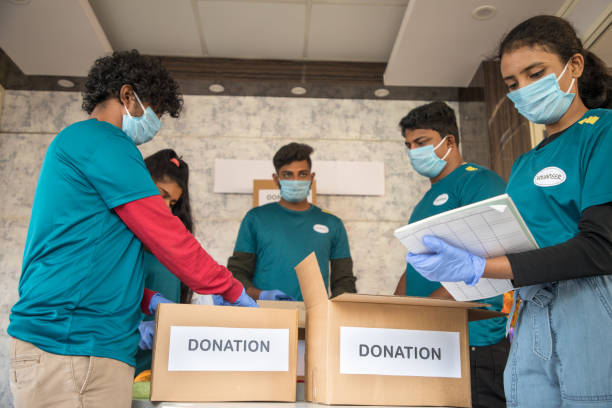Civil society is the lifeblood of a vibrant democracy, representing the collective will and interests of its citizens. In this context, Non-Governmental Organizations (NGOs) play a pivotal role. NGOs are private, non-profit organizations that operate independently of the government, funded by donations, grants, and volunteers. They serve as a bridge between the government and the people, amplifying the voices of the marginalized and advocating for change. In this comprehensive article, we will delve into the multifaceted and vital role that Noida NGOs play in civil society.

Role that NGOs play in Civil Society
Advocacy and Awareness
1.Advocating for Policy Changes: One of the primary roles of NGOs in civil society is advocacy. NGOs often act as the voice of the voiceless, tirelessly working to influence policy changes that benefit society. Whether it’s advocating for environmental protection, women’s rights, or healthcare reform, NGOs are instrumental in driving positive change by pushing for legislative and policy improvements.
2. Raising Awareness: NGOs excel in raising awareness about critical issues. They use various communication channels, including social media, public campaigns, and educational initiatives, to inform the public and policymakers about the pressing problems that need attention. Through these efforts, they mobilize public support and encourage action.
Community Empowerment
1.Building Local Capacity: NGOs empower communities by providing them with the knowledge, tools, and skills they need to advocate for their rights. They conduct workshops, training sessions, and awareness campaigns to build local capacity, fostering self-reliance and active citizenship.
2. Promoting Civic Engagement: Civil society flourishes when citizens are actively engaged in decision-making processes. NGOs facilitate citizen participation by organizing town hall meetings, public forums, and discussions on key issues. They encourage individuals to exercise their democratic rights.
Service Delivery
1.Filling Gaps in Public Services: NGOs often step in to fill gaps in public service delivery. In regions with inadequate healthcare, education, or sanitation services, NGOs run programs and projects to provide essential services to marginalized communities. This ensures that basic needs are met, even when government resources are limited.
2. Humanitarian Aid: In times of crisis, NGOs provide humanitarian aid swiftly and efficiently. They offer relief to disaster-stricken areas, distribute essential supplies, and provide medical assistance. NGOs also play a critical role in post-disaster recovery and rebuilding efforts.
Social Welfare
1.Supporting Vulnerable Groups: NGOs work tirelessly for the welfare of society’s most vulnerable members, including children, the elderly, and people with disabilities. They provide support, care, and services that improve the quality of life for these individuals. This includes programs for orphaned children, elder care services, and disability support initiatives.
2. Healthcare Initiatives: Many NGOs run healthcare programs targeting specific health issues. They offer screenings, vaccinations, and treatments to underserved populations. These initiatives contribute to improved overall health and reduced healthcare disparities.
Human Rights
1.Advocating for Human Rights: Protecting and promoting human rights is a cornerstone of NGO work. They investigate and document human rights abuses, provide legal aid to victims, and advocate for justice and accountability. NGOs play a pivotal role in exposing injustices and holding perpetrators accountable.
2. Legal Assistance: NGOs provide legal aid to individuals and groups whose rights have been violated. They ensure that marginalized communities have access to justice and are not subject to discrimination or abuse.
Conflict Resolution
1.Peacebuilding and Reconciliation: In regions affected by conflict, NGOs often play a crucial role in peacebuilding and reconciliation efforts. They facilitate dialogues between conflicting parties, provide humanitarian aid to affected populations, and work towards long-term stability and peaceful coexistence.
Environmental Conservation
1.Eco-Awareness and Conservation: Many NGOs in Noida are dedicated to environmental conservation and sustainability. They run campaigns, conduct research, and engage communities in eco-friendly practices. By raising awareness and promoting responsible environmental behavior, they aim to protect our planet for future generations.
2. Wildlife Protection: Some NGOs focus on the preservation of endangered species and natural habitats. They work on the ground to protect wildlife from poaching and habitat destruction, often in collaboration with governments and international organizations.
Skill Enhancement and Employment
1.Empowering Through Skill Development: To increase employability and economic prospects, NGOs concentrate on skill development and vocational training. By providing training in various sectors like IT, hospitality, agriculture, and more, they empower individuals to secure better job opportunities, fostering economic growth and reducing unemployment.
2. Entrepreneurship Support: The entrepreneurial potential of citizens is recognized by many NGOs. They offer specialized entrepreneurship training, mentorship, and access to resources for aspiring young entrepreneurs. By fostering a culture of innovation and providing the necessary guidance, NGOs enable individuals to contribute to the local economy and create job opportunities for others.
Children’s Rights and Welfare
1.Protecting Children: NGOs advocate for the rights and welfare of children, working tirelessly to protect them from exploitation, abuse, and child labor. These organizations create safe spaces, provide counseling, and ensure children’s well-being through various initiatives, including schools, orphanages, and child protection services.
2. Education Initiatives: NGOs often focus on ensuring access to quality education for all children, especially those from disadvantaged backgrounds. They establish schools, learning centers, and scholarship programs, bridging the educational gap and empowering children with knowledge that transforms their lives.





Comments